#media: long posts
Text

There are many new friends on the archive, and many are young and have only known social media, which is why I wanted to say something!
Ao3 does not have an algorithm! It isn't a social media site, it's an archive.
Posting fics on Tumblr isn't the same as posting fics on Ao3
Ao3 is like a giant virtual bookshelf, and everyone is able to add their own stories to the bookshelf, all stored with different tags and different fandoms. Works are automatically sorted by newest to oldest, but filters, looking at bookmarks, and using the search function can change that.
Certain works are not pushed to the top like social media posts. More kudos and reads don't push a single work to more viewers by some algorithm. Unless otherwise filtered, works will be at the top of the page based on how recent it was posted.
Smaller fandoms get less views, less kudos, less bookmarks, and larger fandoms get more simply because of the number of people inside the fandom.
Ao3 is a giant virtual bookshelf- there is no algorithm, and there is no man behind the shelf pushing certain books forward.
Happy reading, and if you'd like to have more people notice a fic, why not share it with them! Send a dm to a fandom friend and it might turn into one of their favorite fics!
#ao3#archive of our own#organization for transformative works#i have admittedly only been a member of the committee for a couple of years BUT ive been a member on ao3 since i was much younger#and it took me a hot second to understand how ao3 works; so i wanted to write a lil post about it after seeing this comment#no shade or blame to the person who wrote this by the way!#after being on social media so much it's a completely understandable mistake and i totally get it#and in fandoms populated by younger ppl typically it's even more understandable!#so absolutely no hate no shade no passive aggressiveness#but i do think it is important to learn how the archive works#so if you'd like to share this it would be greatly appreciated! <3#okay have a good day sorry this post/tags became so long haha
42K notes
·
View notes
Text
Happy tdov to fat trans people. 🏳️⚧️ Biggest thing that helped me as a trans kid was seeing older fat trans people. There were a lot of really irritating "advice" posts going around early in my time on the internet with a lot of misinformation in them, but one that I constantly saw (in addition to people claiming you should wear your pants rediculously low or only wear button ups) were posts saying you had to lose weight to transition. Can confidently confirm that is completely untrue. 👍
#seal.txt#tdov#that 'sky and mike' image of the two old trans dudes hugging was one that I had saved to my phone as a trans teen#and i would look at it sometimes and just wonder how they had made it#idk its just nice knowing we live that long and its not a requirement to be skinnyin order to be respected and loved and get old#some of the old 'advice' posts i saw were really completely bizarre and a lot of them stick with me to this day in insecurities#this would have been 2016 ish tumblr so i know not that long ago but i would have been around 13 for reference#weird that i remember so many of the things i read back then. i could probably fill a post with things i was misinformed on due to Tumblr#specifically tumblrs run by people that i didnt really have the knowledge or awareness to understand probably didnt have my best interests#like 'trans rights ' blogs i would follow and not notice until much later were quite the opposite#this is the consequence of viewing social media before i knew all the secret codewords and my brain was much less developed than it is now
1K notes
·
View notes
Text
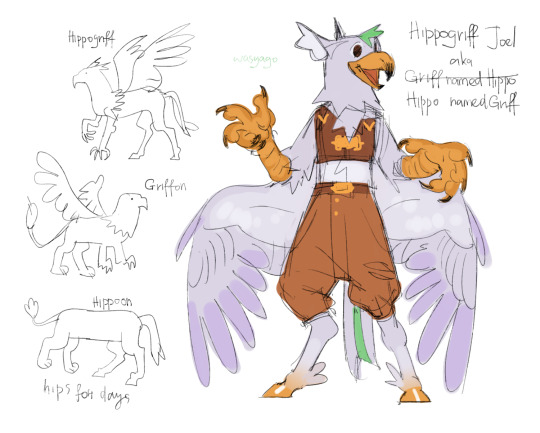
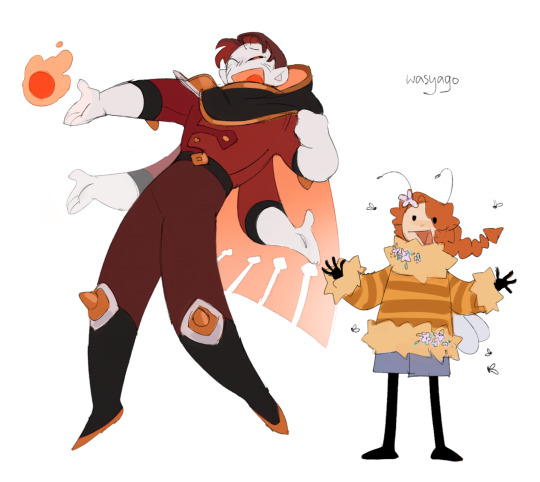
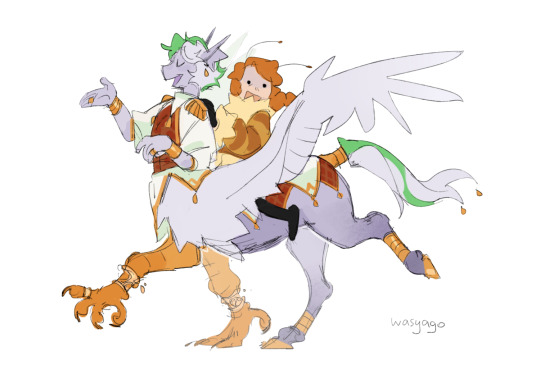
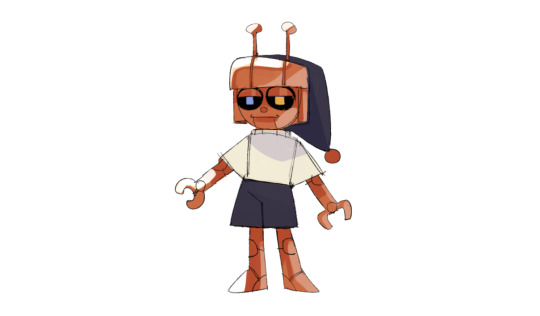
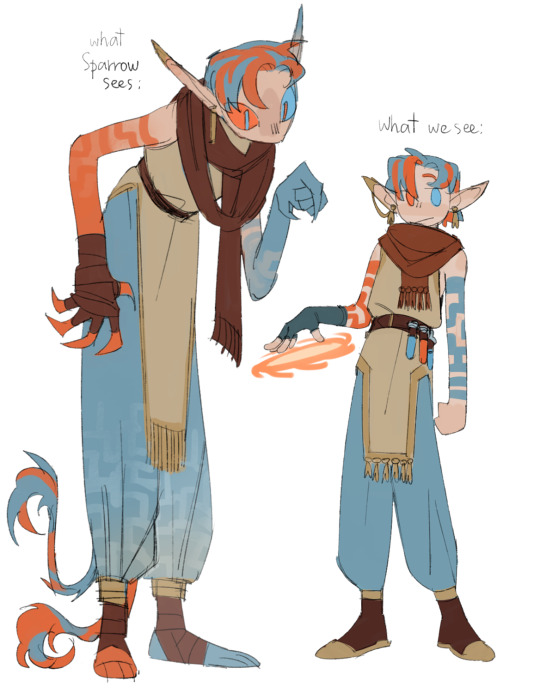
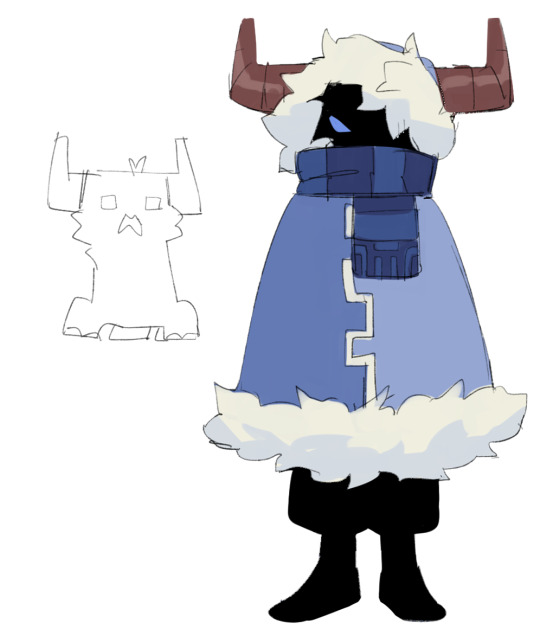
the brainrot won
#GUY S i know i haven't posted anything in a while and thats because im working on a big cool project that i really want to finish without-#distractions. but uh. as you can see. ive been distracted 😔. still working on it tho!!!! and im very happy with it turns out its just-#super time and energy consuming so ive tried to limit my intake of other media to not make myself want to draw other stuff#i also haven't read the last two (two already?????) chapters of RnS and im very sad about it and i want to read it but you know that if i-#read it ill want to make fanart and then ill never finish my project :(#SO. sorrey for the lack of art itll be coming when im free to draw!!!!!!!#but also. yes ive watched new life because i dont want to go insane with nothing but this project on my mind and umm. had to take a little-#break to do a couple designs for fun... and to switch it up a bit because for real im going insane i think#ALSO. friend got me into zelda botw and i haven't played a whole lot yet (because project) but ive tried to take some inspiration for-#designs from there. at least for joel and scott. everyone else not so much...#WELL ANYWAYS this is getting long. i should really stop rambling in the tags and just make separate posts for all this but i dont want to#umm. tags.#new life smp#smallishbeans#mythical sausage#geminitay#pearlescentmoon#smajor1995#inthelittlewood#my art#sketch
4K notes
·
View notes
Text
I just saw a really stupid take from a Star Wars fan (I know, absolutely unheard of! (heavy sarcasm)) so here is a reminder:
People who ship clones with Jedi are more than aware of the power dynamic. That’s a huge part of what makes them interesting. If we were to to ship Cody with basically anyone else other than Obi Wan, it probably wouldn’t work as well because Obi Wan is precisely the last person who would ever want to pressure him or cross his boundaries.
The Jedi were totally screwed over and backed into a war that goes against so much of what they stand for and on top of that, now they have an entire army of brand new humans to lead. All of those brand new humans are totally unique and just experiencing the world for the first time, even though they’re all mature adults too. It’s a totally screwed up situation which puts so much added pressure onto the Order, so we throw romantic feelings on top of that and we’re not supposed to find that absurdly compelling?
Obi Wan is literally defined by his empathy and his kindness. The reason shipping him with Cody works so well is because there is no one who represents what the Jedi are meant to be better than him. Goodness is at the core of his character. There would never be a day that he didn’t value Cody’s wellbeing over his own feelings. Not to mention that they’re both so dedicated to their beliefs and responsibilities that a relationship is never even realistically an option while the war is going on.
Codywan is about the yearning. It’s about them both knowing they have feelings for each other and not being able to do anything about it because they are fighting for something much bigger than themselves. It’s about the infamous “after the war” conversation that they never got to have. It’s about them meeting again on Tatooine years later, finally on equal footing and completely alone in the galaxy, bonded together by their grief.
That’s why people love Codywan. The suggestion of anything otherwise is just an insult to the hard work all the artists and writers have put into making some of the most incredible fanfiction and fanart and fanon lore I’ve ever seen in any fandom ever.
P.S.— the portrayal of something in a piece of media doesn’t equal the condoning or promoting of that sort of behaviour. I thought we’d long since established that. Let’s use our brains here.
#preaching to the masses by putting this in the codywan tag but nvm#if your media literacy is dead I totally get how these ships would seems weird to you#pretty sure every sw ship comes with its ethical complications bc that’s how adult relationships work#it’s about how you handle it#all of my long posts are motivated by either anger or spite#codywan#clone/jedi ships#obi wan kenobi#commander cody#star wars#clone wars#star wars prequels#sw
833 notes
·
View notes
Text
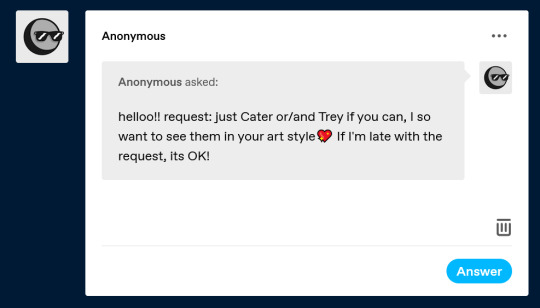


[requests are closed]
Anon i'm sorry this is so late I finished these months ago. I meant to draw more but never got around to it UUUH. SORRY SLDKJSLDGKJSD
I love them so much. I need to draw them more. ;;v;;
-NO ROMANCE INCLUDED-
#isa doobles requests#isa's fanart#insertsomthinawesome#October2023#Twisted wonderland#twst#Cater Diamond#Trey Clover#twst cater#twst trey#i desperately need more of their awkward 'we were best friends but then riddle happened and now we pretend like everything is okay#while secretly knowing nothing i okay' dynamic#Trey is that bestie who does not do social media so whenever you need it you can give him all the tea SLDFKJSDLKJGSD#I'd actually drawn cater before this. But like. Never posted it WHEEZE#that's happened a lot with twst actually go figure.#I DREW THIS AGES AGO.... LIKE. BACK IN APRIL OR SOMETHING.#PROBABLY LATER THAN THAT#ANON I'M SO SORRY IT TOOK ME SO LONG TO POST. I LIED TO MYSELF THINKING I'D FIND TIME TO DRAW MORE#NO. I WAS BOO BOO THE FOOL
3K notes
·
View notes
Text


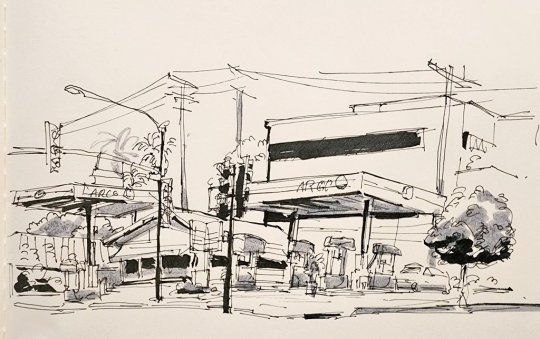
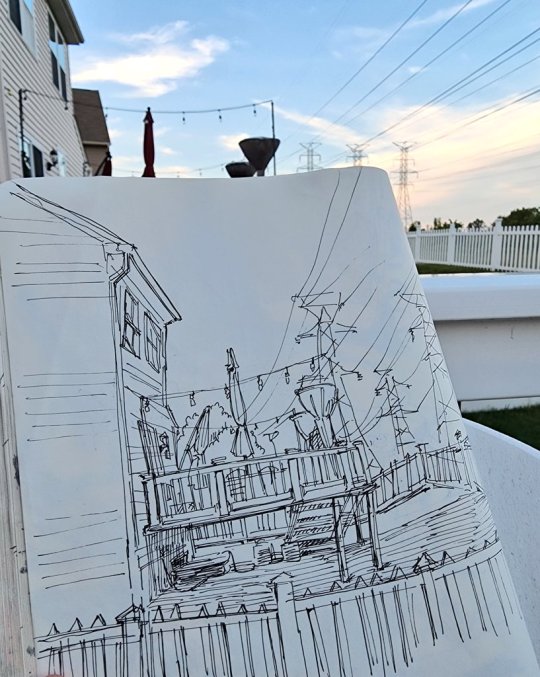
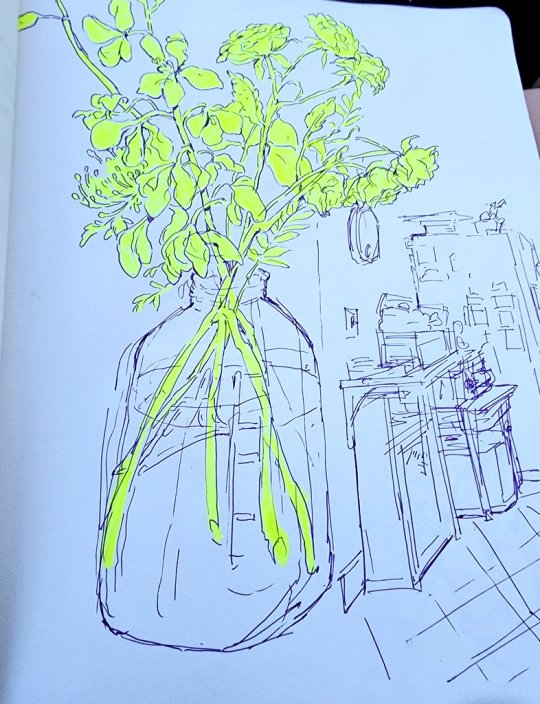
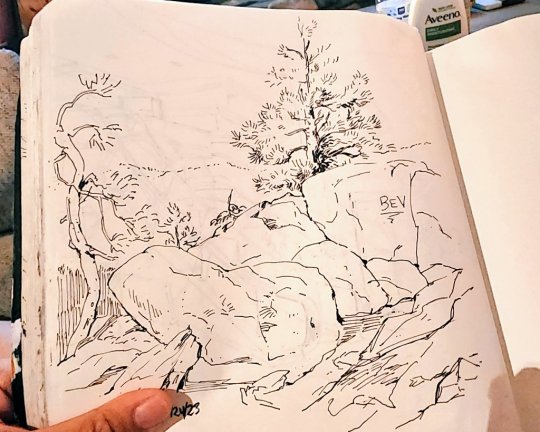
i havent been in front of my computer much this past month so i mostly just have a lot of pictures of my sketchbook
#meruzart#sketchbook#observational art#long post#this is not really relevant but one of my biggest social media fears is i post a pic of a sketchbook or traditional painting that im holdin#and some rando on the internet is like ew ops nails are so dirty!!!!!!!! LMAO#so i clean my nails religiously before taking pics of traditional art
2K notes
·
View notes
Text
The Jaws Effect and what it means for media representation
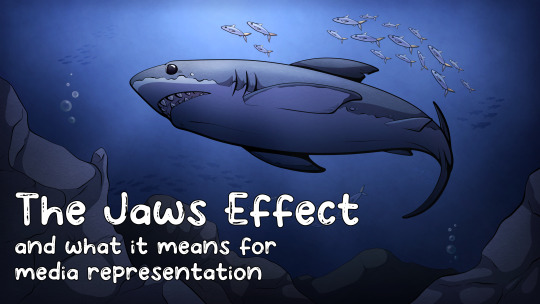
The Jaws Effect is the name of a phenomenon that described the panic and fear that sprang up around sharks, fuelled by Steven Spielberg's movie, Jaws. While the fear of sharks and other marine predators had always been a thing, Jaws launched the fear of sharks, and Great White Sharks in particular, to new (and mostly unfounded) heights. Most people will never encounter a real-life shark and so their only knowledge about the creatures come from movies and other forms of entertainment. Entertainment that largely portrayed them as mindless, unfeeling killing machines. After Jaws, sharks became a staple in the creature-feature genre of movies, which only perpetuated the idea of sharks as dangerous monsters even further, reigniting and reconfirming the beliefs the public held about them in the process. These ideas about sharks are, of course, not true, but the misconception and fear has had a real, observable impacts on shark populations, shark conservation efforts and even laws and legislations surrounding sharks and shark conservation around the world.
Ok but Cy, this is a blog about disability and disabled representation, what do sharks have to do with anything you talk about? Well, Because The Jaws Effect is just one of many examples that shows how massive of an impact representation in the media can have, for better or for worse, especially when talking about subjects the public generally knows very little about.
This conversation is not unique to disability representation, nearly every person I've seen who's talked about how to write and design characters from any minority brings it up eventually, but the media we consume, the movies we watch, the books we read can all have big impacts on people's perceptions on those topics. When talking about disability specifically, it's an unfortunate reality that not many people know all that much about us, and so, much like sharks, for many, their only real exposure to disabled people is through the media they consume.
If you don't know anyone in a wheelchair, and your only knowledge of life as a wheelchair user comes from books and movies like Me Before You, of course you're going to (spoiler) come away thinking that life in a wheelchair is horrible and death is better than living like that. If you don't know any DID Systems and your only exposure to a condition like that is through movies like Split (and honestly, a number of other horror movies and crime shows) of course you'll think people with DID are unstable monsters who could become violent any moment. If your only exposure to autistic people is Music, then it's not shocking that you might think Autistic people are "trapped in their own minds," completely unaware of the world around them and lacking any kind of agency. As much as I'd like to be able to say these are "just movies" or "just books," and that if we don't like them, we can just not watch them, they all had an impact on the real world and real people's perceptions of the disabilities they depicted, as do the many, many smaller examples of bad representation.
This is why I personally spend so much time focused on the portrayal of disability in the media, why so much of my content is focused on creating resources for creators to represent us better, and why I think writers, artists and other types of creators should care about the representation they include.
Unfortunately, people believing misinformation and stereotypes, while annoying, isn't the worst of the impacts bad rep can have. If a stereotype is prevalent enough, and enough people believe it, it can both put us in harms way and cause us to loose access to things we desperately need and things designed to help us. One really common example of this is when movies and TV shows show a character getting up out of their wheelchair, and use this as proof that the person is faking being disabled. However, in reality, there are many disabilities that might mean someone has to use a wheelchair, even if they can still walk a little bit or stand up. The stereotype of someone standing up from their chair being a fake, especially when it's reinforced over and over again in the media, leads non-disabled people to believe that anyone who stands up from their wheelchair is faking, and results in a lot of real disabled people being harassed and denied things like access to disabled parking, toilets and other accessible spaces. There were even a few cases of people reporting those they see get out of their wheelchairs to Centrelink (The Australian "welfare" department, for those not familiar) as frauds, and while these investigations don't usually go far before someone realises what's happened, it has, on occasion, resulted in people loosing the income they depend on to survive, even temporarily.
But the impact of representation, of course, can go both ways.
I was in high school when the first How To Train Your Dragon movie came out, and at the time, I didn't really like people being able to see that I was a leg amputee because I was sick of kids in particular staring, pointing at me, asking their parents "what's wrong with them?" or asking me directly, "what's wrong with your legs?". I wore long skirts and big, bulky tracksuit pants to keep my legs covered, something that became dangerous in the hot Australian summer, but I didn't care.
But the impact of How to Train Your Dragon came in two ways. The first, was that it was one of the first times I'd seen an amputee (or rather, multiple amputees) who didn't keep their prosthetics covered or hidden, and it gave me the little boost in confidence I needed to do that myself and wear clothing that was more comfortable and functional. And second, the comments from children changed, albeit slightly, but enough that it was noticeable. The questions and comments went from "what's wrong with you?" to "oh cool, your legs are like Hiccup's!" I even had one little girl ask me once if I had a pet night fury. They went from being scared of me and my legs, or at the very least concerned for me, to genuinely curious and impressed. While reactions like that did become less and less common over time, they didn't fully go away either. Even today, I occasionally get young kids asking me why I have legs like hiccup. A friend of mine who was born with one arm shorter than the other and without fingers on that side had a similar experience with the movie Finding Nemo. Her disability was a bit more complex than what I described here, and she always found it hard to explain "what happened" to small children, however, after Finding Nemo came out, she was able to simply tell kids "this is my lucky fin, like what nemo has!" and that was enough to take her from someone "scary" to these kids to someone like their favourite characters.
Of course, it's much easier to see the impact positive representation can have on people's perceptions when we're talking about kids media, but it's not exclusive to it either.
When it comes to a minority like the disabled community who are so thoroughly misunderstood by the wider public, misinformation can and does spread easily. What people see and read in the media they consume plays a big roll in how people perceive the real people attached to the stereotypes. We often hear people say "Fiction imitates life" but the reverse can and often is also true, life can imitate and be influenced by fiction, and those of us creating should be mindful of this, especially when we're talking about a group of vulnerable people.
[Thumbnail ID: An illustration of a Great White Shark swimming near the rocky bottom of the ocean, surrounded by silver fish. In the bottom left corner of the image is "The Jaws Effect and what it means for media representation" in big, white bubble text. /End ID]
#Writing disability with Cy Cyborg#Disability 101#Long Post#Disability#Disabled#Disability Representation#Writing Disability#Writing#Writeblr#Authors#Creators#Writing Advice#Disabled Characters#Disability History#On Writing#Disability in Media
761 notes
·
View notes
Text
A while ago I was listening to Dara Horn's podcast relating to her book, People Love Dead Jews. Within this podcast she discussed the fact that Holocaust museums tend to center stories that highlight ways in which Jews were just like anyone else, putting secular Jews on a pedestal of sorts.
The podcast went on to make the point that we shouldn't have to be like them to be liked. A Jew in a kippah is just as worthy of being accepted as a Jew in a baseball cap, and to position one, the more assimilated one, as "better" is antisemitic.
This made me think of how movies and shows portray Jews, and I realized a similar pattern of idealizing assimilation is deeply prevalent.
There are two main ways Jews are portrayed in movies/shows that I've noticed that are problematic. (For a narrower scope I'll be discussing American media as I am more familiar with that than most other countries.)
The first kind of Jewish representation is the token Jew. This is the character that the viewer wouldn't even have known is Jewish had the show not casually mentioned them celebrating Hanukkah in passing. This is the character who is entirely the same as any other character. An example of this would be in Ginny and Georgia, where a few side characters are revealed to be Jewish. This reveal occurred only for the purpose of making a Hanukkah episode, and immediately one of the characters says the beginning words to most of our prayers, adding "bitch" at the end. This sort of absolutely blatant disrespect towards the words many of us wouldn't even speak fully in casual conversation is meant to indicate that it's okay to poke fun at our religion. (By the way, it isn't okay. Don't disrespect our religion, thanks.) (And no the actress wasn't Jewish.)
Then there's Ben Gross from Never Have I Ever, a similarly extremely assimilated Jewish character. Instead of making fun of Judaism, however, the show plays into Jewish stereotypes. Ben's dad is a wealthy influential lawyer who works with Hollywood. Come on, there's three in a row there. Ben himself is frequently made fun of for being very short (to an extent not befitting the actor's actual stature), and some of his mannerisms could be described as effeminate. All of these traits play into anti-Jewish stereotypes. The protagonist even says she wishes Ben was killed by Nazis and other than a scolding this isn't made to be the big deal that it is.
These sorts of characters are meant to show how Jews are "just like you!" and pokes cruel fun at the few remaining things that do occasionally set them apart. Yes, secular Jews exist, but the way these shows make fun of their Jewish identities is where the issue arises.
The second problematic representation is meant to make goyim feel good about being goyim. This is specifically done through how Judaism is portrayed in these movies.
A major example of this is the show Unorthodox, in which the plot centers a young girl trying to escape her very observant community. This show directly demonized the Jewish religion, making it appear inherently oppressive and twisted.
While some may argue that the show was merely trying to portray the social issues within the community, there are better ways to achieve this.
The book An Unorthodox Match takes on a similar task with a vastly different tone. The book centers a protagonist joining an equally observant community, but not for a moment does the book, author, or protagonist blame Judaism. The book is very clearly written by a Jew who loves Judaism, and yet it manages to highlight similar social issues to the show without blaming Judaism. In fact, Jewish traditions have a fair share of appreciation in the book!
This sort of media is meant to make the goyishe viewers be grateful they aren't part of those communities, but as a Jewish viewer I felt deeply uncomfortable with the positioning of religious Jews as a negative part of society. This media makes the characters seem like they have nothing at all in common with the goyim around them or the goyim watching the show. It's the polar opposite of the previous example.
The first example is showing Jews as "just like anyone else" until they aren't, while the second example portrays Jews as entirely other. Never have I seen an Orthodox Jewish character side by side with the non-Jewish characters in any other context than the Jewish character envying their non-Jewish peers.
Why is the choice either to be assimilated or othered? Why can we not have an observant Jewish character remind their friends that they can't hang out on Saturday, or maybe they bring their own kosher snacks? Maybe a Jewish character muttering a bracha over their food? Why not make being Jewish an important part of their character without making them self-loathe because of it?
Media almost only ever shows two extremes and neither of those extremes has a positive impact on the perception of Jews.
(There is also a pattern I've noticed with Jews and goyim being cast in Jewish roles and how that corresponds to the character, but that's probably another post for another time.)

#jumblr#jewish#judaism#jew#antisemitism#Antisemitism in media#long post#sorry for the mini essay haha
557 notes
·
View notes
Text
hot take but i think that "fictional characters are fictional and liking or disliking them have no real life effect" and "the way you treat certain characters can be an indicative of your character in real life" are statements that can and should coexist
example: character A is violent and makes misogynistic comments. they're still charismatic and their arc is interesting to read/watch. person A acknowledges that the character is bad but they still enjoy consuming content from the character and they do so unapologetically. they're allowed to like the character, especially considering that literally everyone the character has harmed is also fictional. they don't pretend the character isn't violent, or misogynistic, they just like the character despite that. they post about it constantly. this is a neutral action that shows nothing about person A.
character B is a white man that makes racist comments, treats a black person in the show badly and gains money through anti-ethical means. they're still charismatic and their arc is interesting to read/watch. person B claims the character is flawed but overall misunderstood and all their actions are entirely justified. they're allowed to like the character, especially considering that literally everyone the character has harmed is also fictional. person B claims the black character that character B treated badly either had it coming or overreacted. all of person B's favorite characters are white men. person B goes out of their way to justify that all of their favorite characters are actually misunderstood and good people, and more people should like them. this shows that person B likely has some favoritism for white men.
just. you're allowed to like fictional characters even if they're awful fucking people but. and im not sure why this is controversial. the way you interact with media says something about you. this isn't necessarily a bad thing. does this make sense please
#im so so tired#and on opioids#prescribed. please#am i expressing my thoughts right#does this make sese#sense#mine#cw discourse#ig#possibly#why is#the way you interact with media says something about you#a controversial take#long post#discourse
923 notes
·
View notes
Text
Grace and the Lords in Black: an analysis.
Okay, so, this may be obvious; although I haven’t seen anyone mention this as of yet. The link between Grace Chastity and the Lords in Black is clear, I mean we’ve all agreed that she seems to be like that, and Dirty Dudes must Die highlights her “corruption” plainly.
That being said! I think there may be more.
Firstly, the Lords in Black mention/talk to Grace first, before Peter and Stephanie (the arguable proper protagonists of this story).
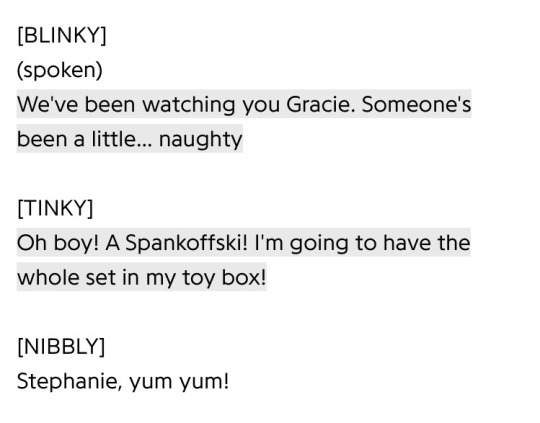
Sure, Blinky’s motif is obvious, it’s of eyes, of watching and of observation. But to speak to Grace first, even if it seems (on the surface level) that it’s just to flex their omniscience and make her uncomfortable, is a little strange. Especially since they then speak mostly (only) to Steph for the rest of the song [The Summoning].
Secondly, because if that were all this wouldn’t be a very good analysis, we have her (Grace) and Nibbly being echoes of eachother.


“Swallow” and “devour” are synonymous. Both fit into Nibbly’s motif of consumption. Now, Grace could’ve said anything. Absorb, harness, control etc. I think the wording here is particular. Not exactly the same, but clearly within the same ball park.
What is exactly the same though, is Grace Chastity and Wiggly.
This may seem a bit out of left field at first, but hear me out.
In The Summoning, it is said that “Wiggly wants his Wrath”, Wrath is a vice, a sin. It may not be the exact opposite of Chastity, however Chastity is to do with restraint, whereas Wrath is very much, not so. Moreover, Wrath can be defined as ‘a great anger that expresses itself in a desire to punish someone’. Now… who else could be described as wrathful? Obviously Max. And Grace. I mean, her song is called Dirty Dudes must Die. As well as being a direct reflection of Max, it implies that she wants to harm someone. Punish someone though? Well, yes. Grace says “This is the consequence of what you’ve done!” - she must believe that death is a worthy punishment for their actions (being ‘pervs’). Thus, Wrath.
Lastly, and this is where the exactly comes in, Grace and Wiggly both say the same things. (Again, of course, I could write another analysis on how Grace and Max reflect each other beautifully by also saying the same/extremely similar things) The difference between Grace saying similar things to Max, is that she and Wiggly aren’t similar. It’s the same.
Example A) Stephy / Stephie.
Upon rewatching Nerdy Prudes Must Die and listening to the album on repeat, I noticed that no one bar these two call Stephanie: Stephie. I know Grace calls Ruth, Ruthy and Peter, Petey- so her calling Stephanie, Stephie, makes sense linguistically. That doesn’t take from the fact that Wiggly is the only other ‘person’ to use that particular moniker.

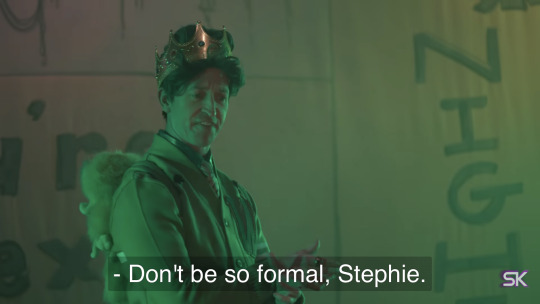
Example B) “bloody bits”
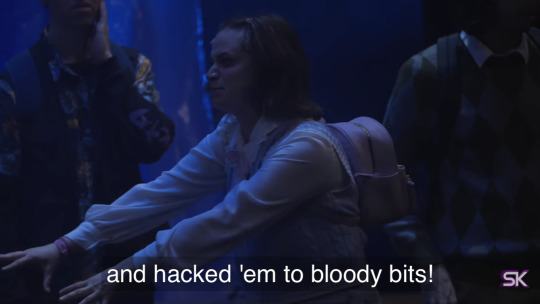
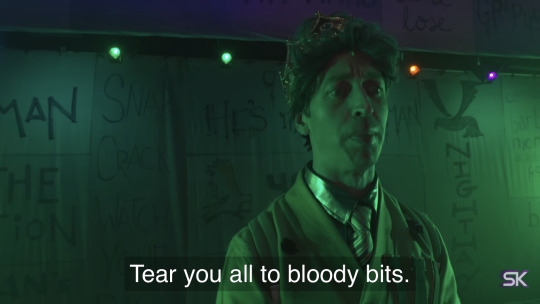
A particularly strange phrase that these two say. However, not really. The point of this analysis is to point out the links between the Lords in Black and Grace Chastity, specifically Wiggly and Grace. By pointing out the parallels in their idiolects, I have come to the conclusion that they are not only linked but INCREDIBLY similar.
Both are characters that use cutesy, almost childish language (“mommy spot” / “belly-well”) to disguise the violence, the wrath that lays beneath the surface. Wiggly (as shown in Black Friday) uses it as a facade. Throughout Black Friday and throughout The Summoning, he expresses himself as non-threatening (“We’re all pally-wals.” etc) before eventually showing what’s beneath the surface (“..deck the fucking halls!” / “We don’t give a shit about your phone!”). Both times are as abrupt as each other, showing that Wiggly has a fairly short temper. Grace doesn’t necessarily have a short temper, instead she has periods of ‘sin’, when stressed: Dirty Girl, calling “God a son of a B-Word”, smoking (after), having sex with Max, the scene of her ordering hot water etc etc. The visage, her carefully constructed facade, slips. Wether it’s because deep down she doesn’t believe in God (possibly shown in her “are you religious?” conversation with Shapiro), or that due to her upbringing she’s being confined, restrained, controlled, and this is when her ‘true self’ begins to peer through the cracks.
Either way, these are two characters who use similar themes (one of childishness, the other of purity/innocence (which can also be linked to childishness)) to cover their violence, their real selves.
Uhhh- anyway, watch Nerdy Prudes must Die on Youtube- it gave me brain worms.
#starkid#starkid productions#nerdy prudes must die#starkid npmd#hatchetverse#hatchetfield#starkid analysis#npmd#npmd theory#npmd analysis#tw long post#long post#essay#media analysis#character analysis#wiggly#wiggog y'wrath#grace chasity#npmd grace#lords in black#starkid musicals#lyric analysis#musical analysis#tickle me wiggly#the summoning#dirty dudes must die#bliklotep#nibblenephim#nibbly#blinky
949 notes
·
View notes
Text
Tim has life-threatening allergies that no one, not even himself, takes seriously. You can not change my mind.

#dick grayson#jason todd#damian wayne#bruce wayne#tim drake#stephanie brown#bullying is okay as long as it's tim drake#get his ass#social media au#bunch of idiots#my post#give the boy some benadryl
836 notes
·
View notes
Text
Been watching that new Hazbin Hotel show as it's coming out (🏴☠️) and I'm pretty disappointed with it. I'm not super familiar with the Everything about it, but I remember watching the pilot way back when and liking the premise.
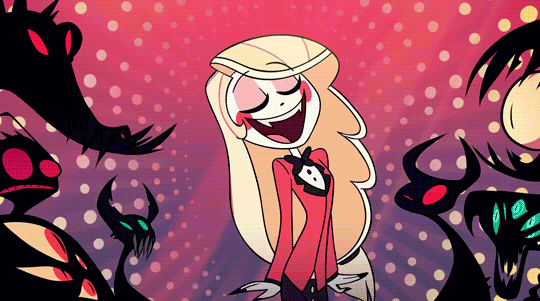
I hadnt kept up with it after the pilot because I wanted to see it with fresh eyes. Now that the show is coming out, somehow I feel like an outsider watching it lol. It presents a lot of concepts, but it just assumes the watcher is already familiar with the characters, and it makes the pacing reeeeally odd. It's all payoff, no buildup (unless you count the years fans had to wait for it as 'build up'). I feel like I REALLY need to look for supplementary material to understand what's going on,, like.... why was there a whole emotional power ballad for a character who was only introduced 10 minutes prior?? Was I supposed to know who she was?😭 (her heels were cool though)
Tonally it's strange, too. It feels like an adult show written for teenagers a lot of the time, which is the BIGGEST disappointment. I was really hoping for more thoughtful explorations of the characters, but we really only get that for Angel Dust and like .... no one else lol. (Sir Pentious is the 👏FUCKING👏BEST👏)
Charlie and Vaggie feel ESPECIALLY underbaked. Considering how overtly sexual the show is, it's SHOCKING how little chemistry they have. Like, it's not there at all. I watched the show with a friend who had no knowledge about Hazbin Hotel whatsoever, and during episode 4, she asked me,"So why is Vaggie helping here?" which I feel is the best example I can give for how poorly developed their relationship is.
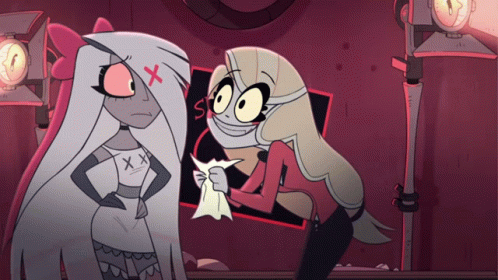
I like the music. The song transitions are usually really jarring (Respectless and Hell's Greatest Dad come to mind) but the songs themselves are usually bangers. I'm a big fan of Loser, Baby.
The designs are ..... not for me. But that's not necessarily a criticism. A lot of the character designs feel very dated, but I respect them for sticking so hard to the aesthetic they present, even if its not for me. I wish there was more outfit and body type variety in the characters, but literally EVERYONE says that, so I'll just leave that there lol.
Overall I think this show is a shining example of why """"filler"""" episodes are so important. If this were a 12 or even 24 episode season I think it'd be way better, but as it is, they're trying to cram like 15 different character arcs + a dramatic overarching story into 8 episodes, and it's really REALLY suffering for it.
#please dont read this as a hate post please dont read this as a hate post please dont read this as a hate post#ive just been watching it and its stuck with me but in a disappointing way#i cant say i like it. but its interesting to pick apart#for every element i really enjoy theres two that i really dislike. strange viewing experience#thats all. thanks for coming to my annual Syrup Watches A Weird Piece Of Media And Talks About It For Tooooo Long tedtalk#not art
745 notes
·
View notes
Text
I actually love glass onion being set deep in covid times but where's the post that was like . Glass Onion should have ended with benoit blanc getting home and testing positive for covid . I really think that would've tied the whole thing together
#glass onion#fr coulda been a post credits scene! u don't want to disrupt the power of the final scene tho i guess#do u think the stuff ethan hawke shot in their mouths was a spurious miles bron vaccine or just like. ivermectin#anyway . I have seen this post thsi is not an original idea. where is it.#please can more media reference covid it's gonna be TOO ! WEIRD! if our popular culture just flat out ignores this major thing#that disrupted THEE entire world for so long.#saw someone be like 'covid happened two years ago why are people still talking about it' uh !#anyway . glass onion handshake emoji the borat sequel . for having covid in it#they fully all got covid that weekend. this is my belief
4K notes
·
View notes
Text

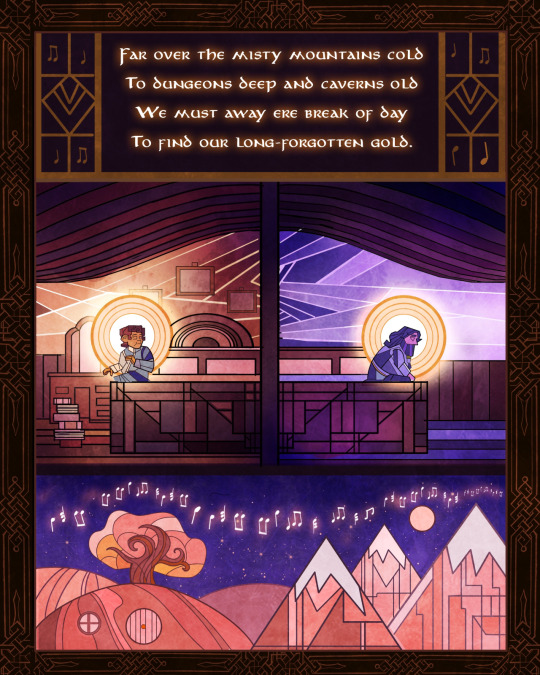




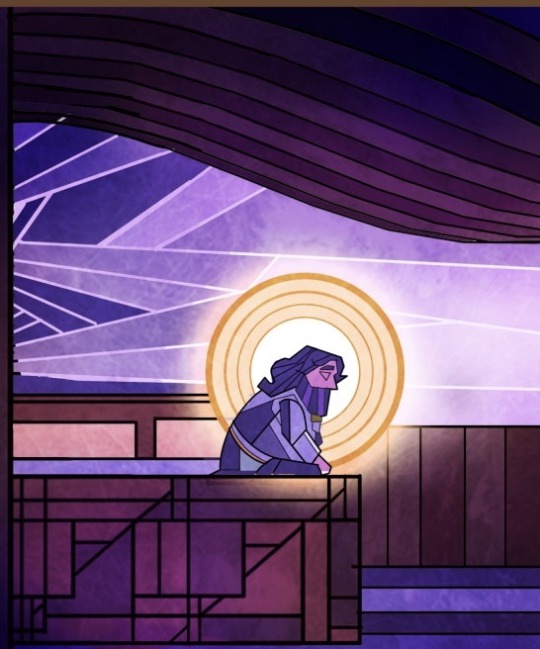
As he lay in bed he could hear Thorin still humming to himself in the best bedroom next to him:
Far over the misty mountains cold
To dungeons deep and caverns old
We must away, ere break of day,
To find our long-forgotten gold.
Bilbo went to sleep with that in his ears, and it gave him very uncomfortable dreams.
This moment from chapter 16 of The Hobbit comic adaptation symbolizes the core of the relationship between Bilbo and Thorin, in this version of the story.
Bilbo and Thorin are both awake long after everyone else is asleep, kept up by their anxieties over the journey.
Bilbo’s room is decorated with a bunch of little objects; Thorin is in a spare room that is completely empty. It’s a “visual reference” to the idea that Bilbo has a home in Bag End, and tons of little treasures of his own that he’s very attached to— but Thorin has none, because the Lonely Mountain and its “long forgotten gold” was taken from him.
(You can read the full comic adaptation here on tumblr, on Webtoon, or on Ao3, and tip the artist/preview the next chapters on Patreon!)
#the hobbit#not chapters#the hobbit comic#bagginshield#it’s about the Symbolism#also putting posts together takes#so long!!!!#I’m starting to understand why some artists just have social media teams
512 notes
·
View notes
Text
Jason Todd’s death storyline was perfectly executed because they killed him figuratively (killed his innocence) before actually killing him. It’s a tragedy because he died in two separate ways. And the reason his resurrection is just as much a tragedy is because only one of the things killed can be brought back and it wasn’t the thing that made Jason who he is (his innocence and kindness).
#I actually have a whole ass like four plus paragraph essay about this in my drafts#like a whole long post#if anyone wants that please RR log or comment telling me to post it#and just a BTW: just because I love the tragedy of the RH and analyze it doesn’t mean I like the RH as a character or as a concept#I still strongly believe that it ruined Jason as a character#dc comics#comics#robin#batfam#bruce wayne#batman#jason todd#redhood#a death in the family#under the red hood#pre-red hood#young jason todd#robin jason todd#media analysis#character analysis#red hood character analysis#Jason Todd analysis#detective comics#dc#DCU#dc universe#batboys#batbros#batfamily#batclan
427 notes
·
View notes
Text
Epiphanies about what I like in my media
little guys facing the Horrors
little guys becoming the Horrors
incomprehensible/incomplete/vague lore (that i try to comprehend and interpret anyway, for the laughs)
see also: "is this a bug or feature"
cool tech
sad old isolated women learning how to move on from past traumas
world is absolutely fucked but we find beauty and hope in it anyways
random god(s)
finding meaning in our messy lives, making friends along the way
#just thought id make a list tbh#and post it all online for others to judge me#for those who are curious#the media i am thinking of includes;#rain world#(a bit obvious)#undertale#fools gold#warframe#(haven't played in a long while though)#stellaris#rimworld
446 notes
·
View notes